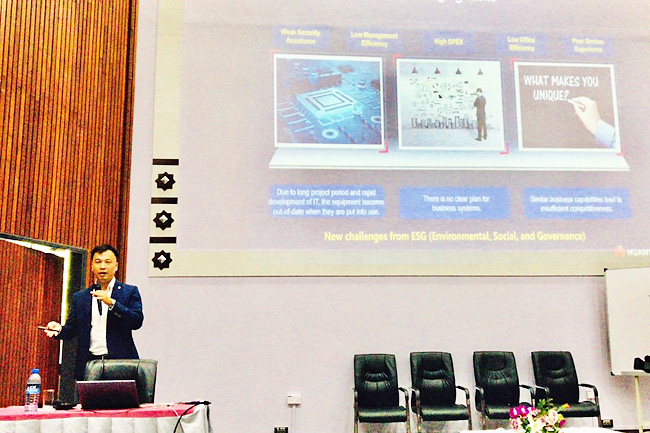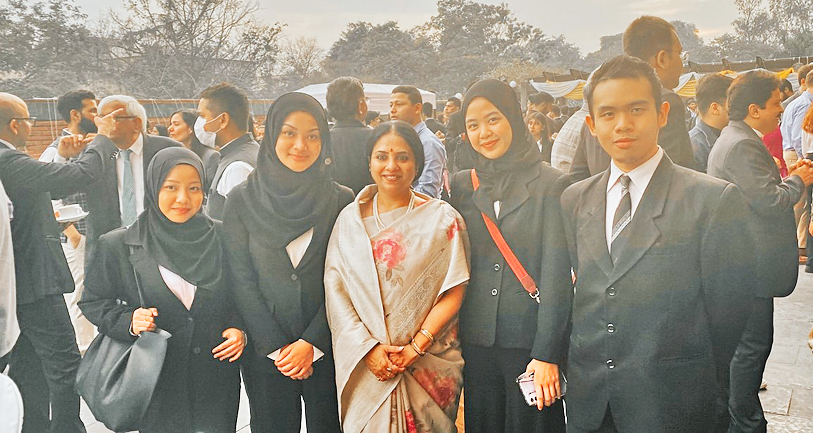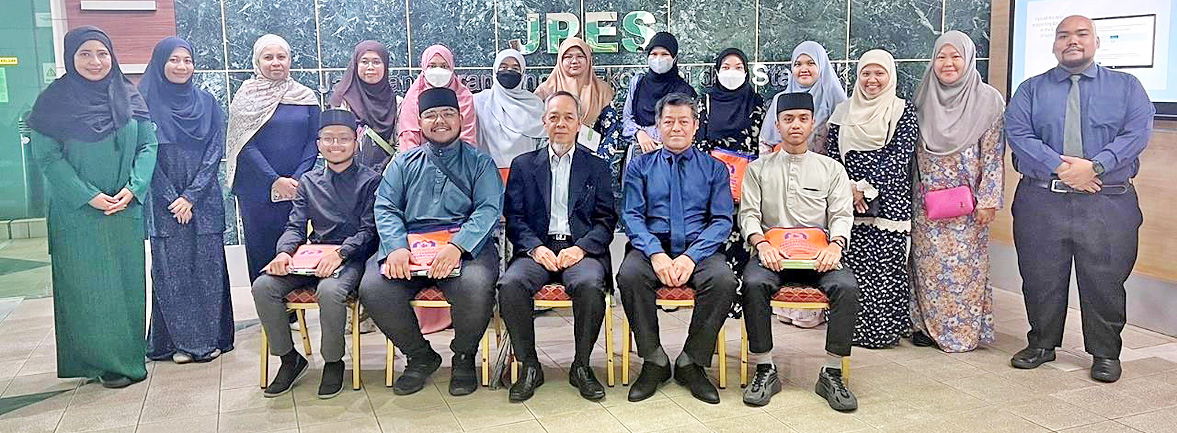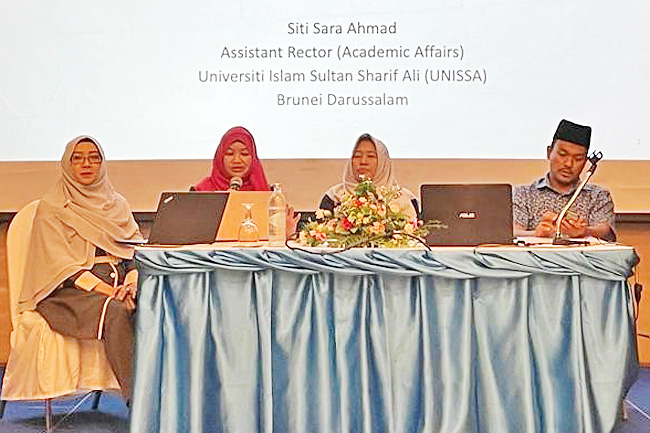Universiti Islam Sultan Sharif Ali (UNISSA) staff and students held and participated in various events.
The university’s Faculty of Islamic Technology held a monthly knowledge-sharing session on smart campus technology recently.
Huawei Technologies (B) Sdn Bhd Solution Director Alvin Li Peng delivered the session in the Jubilee Hall at UNISSA campus in Gadong.
The session aimed to provide faculty members and students with insights into the latest trends and innovations in smart campus technology and how it can be leveraged to enhance the overall learning experience for students.
The session covered various topics, including the Internet of Things (IoT), artificial intelligence (AI), and cloud computing.
“We are pleased to have Li Peng share his expertise on smart campus technology,” said Dean and Senior Assistant Professor of the Faculty of Islamic Technology Dr Hajah Tiawa binti Haji Hamid.
“His insights and knowledge will be valuable as we explore the potential of smart campus technology to enhance the learning experience for our students.”
Smart campus technology has the potential to transform the way universities operate and teach.




It includes smart classrooms, online collaboration tools, and IoT sensors to enhance students’ learning experience.
The sharing knowledge session is part of UNISSA’s efforts to promote innovation and technology and enhance faculty members and students with technology skills.
“Smart campus technology can help universities provide a personalised and engaging learning experience for students,” said Li Peng.
“We are pleased to collaborate with UNISSA to explore the potential of smart campus technology and support their efforts.”
The knowledge sharing sessions provide a platform for experts and students to share their knowledge and ideas.
By incorporating technology into the learning experience, UNISSA aims to improve student engagement and learning outcomes.
Interactive learning tools, multimedia resources, and online platforms will provide students with new ways to engage with course material and connect with their peers and instructors.
Technology can also facilitate collaboration and knowledge sharing among students and faculty, enhancing the learning experience.
Meanwhile, UNISSA also participated in an international moot court competition in New Delhi, India.
Supreme Court Justice BR Gavai, as chief guest in the final round, expressed admiration for the fact that law students today have access to both legal and practical education, which he did not have when he was studying law.
He said the practice of law is a continuous learning process and that one must never stop learning.
Over 90 teams participated in the KK Luthra Memorial Moot Court Competition for the written submission. Only 60 teams, including UNISSA made it to the shortlist.
Participants in the preliminary round included overseas law schools including Northumbria University, Prithvi Narayan Campus, Kathmandu University School of Law, National Law College (Nepal), the University College London, Zimbabwe Ezekiel Guti University, Great Zimbabwe University, University of Ibadan (Nigeria) and Bangladesh University of Professionals. UNISSA’s involvement empowers and showcases their law students’ advocacy skills.
Justice Sudhanshu Dhulia of the Supreme Court was the chief guest at the competition’s inauguration.
The final round was judged by the judges of the Delhi High Court.
Supreme Court Justice BR Gavai was the chief guest, and Justice CD Singh, Swarana Kanta Sharma, and Justice Anish Dayal of the Delhi High Court were the guests of honour at the prize distribution ceremony.
The competition is named after late Senior Advocate KK Luthra who was an eminent criminal lawyer and appeared in various trial courts, High Courts, and the Supreme Court of India in a variety of matters during his legal career spanning 49 years.
Some 12 UNISSA students and one lecturer also conducted a visit to the Department of Economic Planning and Statistics (JPES) of the Ministry of Finance and Economy on March 4. The study visit aimed to enhance knowledge of Balance of Payments statistics as well as concepts used in its compilation.
The Balance of Payments is one of the statistics released by JPES as one of the measures in monitoring the economic development of the Sultanate.
Meanwhile, UNISSA participated in the Asian Islamic Universities Association (AIUA) workshop on Managing Outbound and Inbound Student Mobility programme in Krabi, Thailand, on February 25 and 26.
The workshop aimed to share experiences in managing inter-country student mobility programmes among AIUA member countries.
UNISSA participated as a member of the organisation and was represented by Assistant Rector (Academic) Associate Professor Dr Siti Sara binti Haji Ahmad and Hajah Tiawa.
UNISSA Rector Dr Haji Norarfan bin Haji Zainal, who also serves as the Deputy President of AUAP for 2022 to 2024, encouraged UNISSA’s participation.
Over 50 participants from various countries, including Thailand, Malaysia, and Indonesia attended the workshop.
Participants discussed the International Student Mobility programme and guidelines for member countries’ programmes.
Associate Professor Dr Siti Sara shared UNISSA’s student mobility programme, which was found to be more current and extensive in sending its students to international programmes, and not just ASEAN member countries.
Other participants were inspired to develop similar programmes.
The workshop indicated that inter-country student mobility programmes provide advantages including cross-cultural experience and knowledge, the development of international networks and connections, and the enhancement of students’ education and skills.






